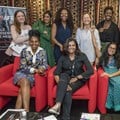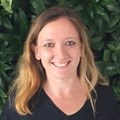One of the highlights of last year's Loeries Masterclasses was the Women in Marketing (WIM) Africa launch event. Here Andrea Opoku, director and Africa ambassador for Women in Marketing, shares growth since then as well as the context of this year's WIM Africa event on the power of women in influencer marketing, with some interesting global insights.
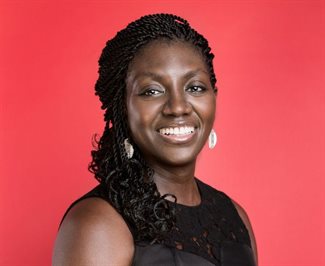
Andrea Opoku, director and Africa ambassador for Women in Marketing.
Last year's WIM Africa launch event was an amazing experience.
There was a special masterclass as part of Loeries Creative Week, but in the months that followed, the team continued to receive messages of support and interest in what exactly Women in Marketing is doing.
Opoku says this demonstrated that there’s still a need to continue pushing the female agenda.
While there are a lot of organisations, initiatives and campaigns out there, with each doing its part in inspiring, advocating and making a change for women and society as a whole, she says there is, and always will be, a need and space for more to be done.
Here, Opoku talks us through this year’s influence-themed WIM Africa event, as well as future plans for WIM Africa and how you can get involved…
So good to catch-up again! Let us in on the context of this year's WIM Africa influence-themed event.
Yes! As women, we often underestimate the power we hold within ourselves. The power to determine the lives we lead and how we can effect change in our communities and society as a whole.
We are not powerless, we just sometimes don’t have the confidence or knowledge in how to use it. Knowing how to use your experience, knowledge, networks, relationships and communication in order to influence an outcome or a change in behaviour is an extremely powerful leadership skill, and one in which women in particular need to develop more.
This topic on influence is one that I’ve wanted to address for a while now.
On a personal level, like most women, no matter their level of seniority, we struggle to fully exploit our powers of influence. There is sometimes a sense of not wanting to make too much noise or take up too much space. But as women we must not shy away, we must step into our power and become the best versions of ourselves.
After speaking to a few people including Taweni Gondwe-Xaba, the CMO of the Durban Chamber of Commerce and Industry with whom we have partnered on the Influence event, we decided that now is the right time to address this topic.
It’s also women’s month in South Africa. If we think about the 20,000 women who marched in 1956 for the rights of black South Africans, we also think about how they demonstrated that as a collective, we have the power to influence the trajectory of society.
As a network of marketing professionals, we can’t address the topic of influence without also looking into influencer marketing, particularly given its growth over the last few years and some of the controversy around the practice.
The event addressed many of the questions businesses and marketing professionals have around finding the right influencers for their brand, maximising return on investment and the metrics they need to keep an eye on.
Excellent overview for those who missed it. How were speakers/panellists chosen? What's their common thread?
The influence event had two threads, so I wanted to include women who are doing great things in their organisations and communities to share their stories, who could also talk about influencer marketing and what they're doing in that space.
Facebook is the world’s biggest social media network although not necessarily a key player itself, with only 2%* of social influencers for brand collaborations worldwide using Facebook as their primary social media platform.
It’s immense power as a platform to help people and organisations galvanise and influence the behaviour of audiences around the world for social and political change meant that this conversation couldn’t have been had without them. Instagram on the other hand, part of the Facebook family, has 78% of social influencers using the platform as their primary social media channel.
Such an interesting insight. As you mentioned, it's #WomensMonth in SA, so fitting to focus on the discussion point of the power of women in influencer marketing. Share some stats and how the region compares globally.
South African influencers have higher engagement rates than the global average, but globally it is evident that there are considerably more female influencers than male, and they have more success than their male counterparts:
- Female Instagram users get five times more likes than male users. They have more fans and engaged followers. And, not only do they have a strong impact on female followers, but their content is also most likely to be shared by men.
- Women are generally more active on social media than men, and share more personal stories, which engages more followers. This is true of all social media platforms, except for LinkedIn.
- Women have more influence when it comes to engagement rates. Their followers are more active and more likely to interact with their content. Data from HopperHQ showed that the average number of likes for female Instagram influencers was 578, compared to 117 for male users.
- Women also seem to have considerable influence on men. HopperHQ’s research showed that men are 10 times more likely to share, comment or like a woman’s post than posts by male Instagram users.
Many of these points were unpacked during the mini masterclass element of the Influence event, which was delivered by Stephane Rogovsky, CEO of R-Squared Digital.
No matter what your thoughts are on influencer marketing, we can’t deny the growth of the practice. Brands are set to spend $15bn on influencer marketing by 2022, whilst spend is predicted to be $8bn by the end of 2019.
Definitely the space to be in. Let's end with some insights into WIM Africa's future plans.
We have our 2019 Global WiM Awards, which are open for nominations at the moment.
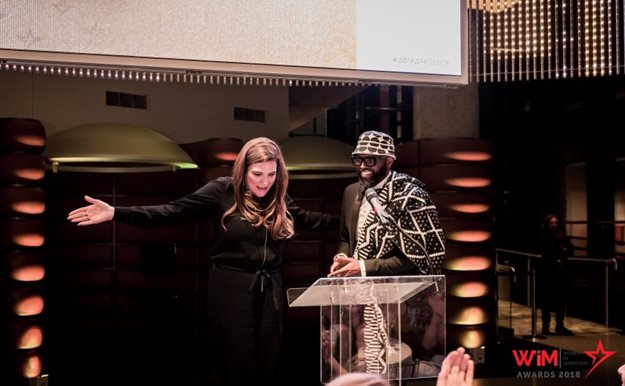
Mzamo Masito of Google collecting his 'equality advocate of the year’ award at the Women in Marketing Awards 2018 in the UK.
Last year, South Africa’s very own Mzamo Masito won the ‘equality advocate of the year’ award, and joined us in the UK to collect his award.
There was considerable uptake in award entries last year due to the network launch, and we hope to increase that even more this year. For more information on the award categories and how to enter, click here.
Although progress has been slow, one of the initiatives that we are making headway within South Africa is our mentoring programme to help support women in the marketing, communications and advertising fields to achieve their potential.
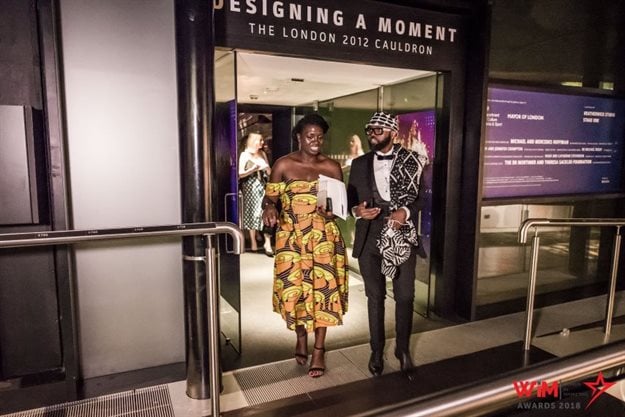
Opoku and Masito at last year's Women in Marketing Awards.
We are running a pilot programme early 2020 and are looking for our last few partner organisations to come on board. We’ll share progress once the pilot launches, but any organisations interested in being a part of the programme should get in touch with us.
Also keep an eye on Women in Marketing’s Twitter, Facebook and Instagram feed for the latest updates!
*Disclaimer: Leigh Andrews is a Women in Marketing: Africa advisor, ran the panel at the WIM Africa launch event at #Loeries2018 and was the first-ever SA nominee for the global WIM Journalist of the Year Award.
























































